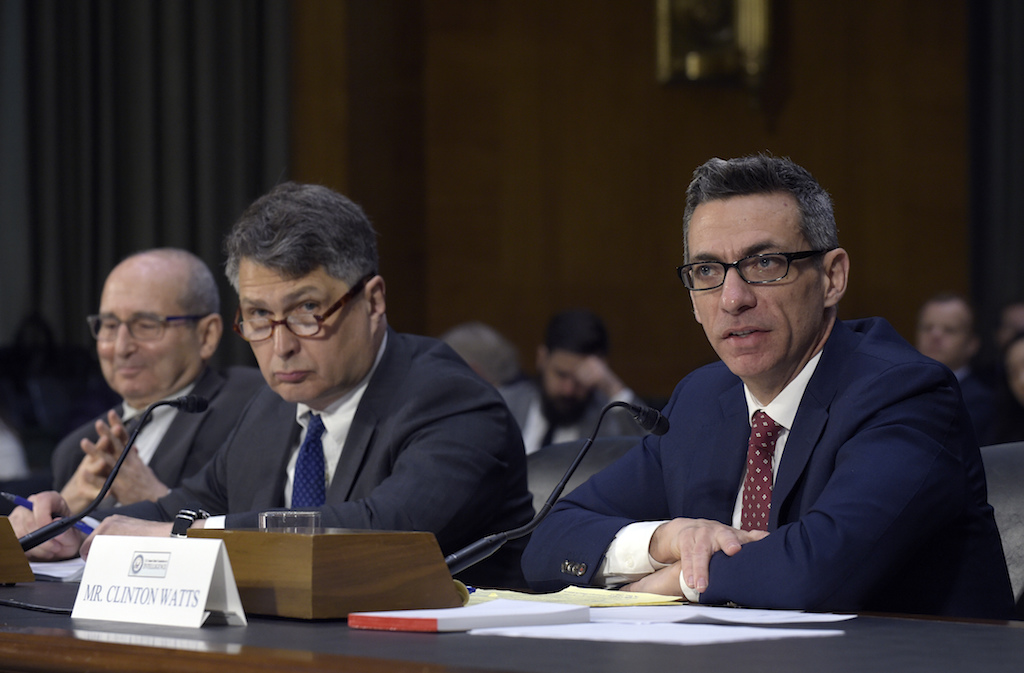McCarthyism Inc.: Hyping the Russian Threat to Undermine Free Speech
Clint Watts, a dubious counterterror "expert," is lobbying the U.S. government to use media censorship as a remedy to Russian interference. Clint Watts, right, a senior fellow at the Foreign Policy Research Institute Program on National Security, testifies at a Senate Intelligence Committee hearing on Russian intelligence activities. (Susan Walsh / AP)
Clint Watts, right, a senior fellow at the Foreign Policy Research Institute Program on National Security, testifies at a Senate Intelligence Committee hearing on Russian intelligence activities. (Susan Walsh / AP)
Nearly a year after the presidential election, the scandal over accusations of Russian political interference in the 2016 election has gone beyond Donald Trump and reached into the nebulous world of online media. On November 1, Congress held hearings on “Extremist Content and Russian Disinformation Online.” The proceedings saw executives from Facebook, Twitter and Youtube subjected to tongue-lashings from lawmakers like Republican Sen. Chuck Grassley, who howled about Russian online trolls “spread[ing] stories about abuse of black Americans by law enforcement.”
In perhaps the most chilling moment of the hearings, and the most overlooked, Clint Watts, a former U.S. Army officer who had branded himself an expert on Russian meddling, appeared before a nearly empty Senate chamber. Watts conjured up a stark landscape of American carnage, with shadowy Russian operatives stage managing the chaos.
“Civil wars don’t start with gunshots, they start with words,” he proclaimed. “America’s war with itself has already begun. We all must act now on the social media battlefield to quell information rebellions that can quickly lead to violent confrontations and easily transform us into the Divided States of America.”
Next, Watts suggested a government-imposed campaign of media censorship: “Stopping the false information artillery barrage landing on social media users comes only when those outlets distributing bogus stories are silenced: silence the guns and the barrage will end.”
The censorious overtone of Watts’ testimony was unmistakable. He demanded that government news inquisitors drive dissident media off the internet and warned that Americans would spear one another with bayonets if they failed to act. And not one member of Congress rose to object. In fact, many echoed his call for media suppression in the House and Senate hearings, with Democrats like Sen. Dianne Feinstein and Rep. Jackie Speier agreeing the most vehemently. The spectacle perfectly illustrated the madness of Russiagate, with liberal lawmakers springboarding off the fear of Russian meddling to demand that Americans be forbidden from consuming the wrong kinds of media—including content that amplified the message of progressive causes like Black Lives Matter.
Details of exactly what transpired vis a vis Russia and the U.S. in social media in 2016 are still emerging. This year, the Office of the Director of National Intelligence published a declassified version of the intelligence community’s report on “Assessing Russian Activities and Intentions in Recent U.S. Elections,” written by CIA, FBI and NSA, with its central conclusion that Russian efforts to influence the 2016 presidential election represent the most recent expression of Moscow’s longstanding desire to undermine the U.S.-led liberal democratic order.”
To be sure, there is ample evidence that Russian-linked trolls have attempted to exploit wedge issues on social media platforms. But the impact of these schemes on real-world events appears to have been exaggerated. According to Facebook’s data, 56 percent of Russian-linked ads appeared after the 2016 presidential election, and another 25 percent “were never shown to anyone.” The ads were said to have “reached” over 100 million people, but that assumes that Facebook users did not scroll through or otherwise ignore them, as they do with most ads. Content emanating from “Russia-linked” sources on YouTube, meanwhile, managed to rack up hit totals in the hundreds, not exactly a viral smash.
Facebook posts traced to the infamous Internet Research Agency troll factory in Russia amounted to only 0.0004 percent of total content that appeared on the social network. (Some of these posts targeted “animal lovers with memes of adorable puppies,” while another hawked an LGBT-themed “Buff Bernie coloring book for Berniacs.”) According to its “deliberately broad” review, Twitter found that only 0.74 percent of its election-related tweets were “Russian-linked.” Google, for its part, documented a grand total of $4,700 of “Russian-linked ad spending” during the 2016 election cycle. While some have argued that the Russian-linked ads were micro-targeted, and could have shifted key electoral voting blocs, these ads appeared in a media climate awash in a multi-billion dollar deluge of political ad spending from both established parties and dark money super PACs.
However, a blitz of feverish corporate media coverage and tension-filled congressional hearings has convinced a whopping 82 percent of Democrats that “Russian-backed” social media content played a central role in swinging the 2016 election. Russian meddling has even earned comparisons by lawmakers to Pearl Harbor, to “acts of war,” and by Hillary Clinton to the attacks of 9/11. And in an inadvertent way, these overblown comparisons were apt.
As during the aftermath of 9/11, the fallout from Russiagate has spawned a multimillion-dollar industry of pundits and self-styled experts eager to exploit the frenetic atmosphere for publicity and profits. Many of these figures have emerged out of the swamp that flowed from the war on terror and are gravitating toward the growing Russia fearmongering industrial complex in search of new opportunities. Few of these characters have become as prominent as Clint Watts.
So who is Watts, and how did he emerge seemingly from nowhere to become the star congressional witness on Russian meddling?
Dubious Expertise, Impressive Salesmanship
A former U.S. Army officer who spent years in obscurity at a defense industry funded think tank called the Foreign Policy Research Institute (FPRI), Watts has become a go-to source for cable news producers and print journalists on the subject of Russian bots, always available with a comment that reinforces the sense that America is under sustained cyborg attack. This September, his employers at FPRI hailed him as “the leading expert on developments related to Russian-backed efforts to not only influence the 2016 presidential election, but also to inflame racial and cultural divisions within the U.S. and across Europe.”
Watts boasts an impressive-looking bio that is replete with fancy sounding fellowships at national security-oriented outfits, including George Washington University’s Center Cyber and Homeland Security. His bio also indicates that he served on an FBI Joint Terror Task Force.
Though Watts is best known for his punditry on Russian interference, it’s fair to say he is as much an expert on Russian affairs as Harvey Weinstein is a trusted voice on feminism. Indeed, Watts appears to speak no Russian, has no record of reporting or scholarship from inside Russia, and has produced little to no work of any discernible academic value on Russian affairs.
Whether or not he has the substance to support his claims of expertise, Watts has proven a talented salesman, catering to popular fears about Russian interference while he plies credulous lawmakers with ease.
Before Congress, a String of Deceptions
Back on March 30, as the narrative of Russian meddling gathered momentum, Watts made his first appearance before the Senate Select Intelligence Committee.
Seated at the front of a hearing room packed with reporters, Watts introduced Congress to concepts of Russian meddling that were novel at the time, but which have become part of Beltway newspeak. His testimony turned out to be a signal moment in Russiagate, helping transition the narrative of the scandal from Russia-Trump collusion to the wider issue of online influence.
In the widely publicized testimony, Watts explained to the panel of senators that he first noticed the pernicious presence of Russian social media bots after he co-authored an article in 2014 in Foreign Affairs titled, “The Good and The Bad of Ahrar al Sham.” The article urged the US to arm a group of Syrian Salafi insurgents known for its human rights abuses, sectarianism and off-and-on alliances with Al Qaeda. Watts and his co-authors insisted that Ahrar al-Sham was the best proxy force for wreaking havoc on the Syrian government weakening its allies in Iran and Russia. Right below the headline, Watts and his co-authors celebrated Ahrar al-Sham as “an Al Qaeda linked group worth befriending.”
Watts rehashed the same argument at FPRI a year later, urging the U.S. government to harness jihadist terror as a weapon against Russia. “The U.S. at a minimum, through covert or semi-covert platforms, should take advantage and amplify these free alternative [jihadist] narratives to provide Russia some payback for recent years’ aggression,” he wrote. In another paper, Watts asked, “Why shouldn’t the U.S. redirect some of the jihadi hatred towards those with the dirtiest hands in the Syrian conflict: Russia and Iran?” Watts did not specify whether the theater of covert warfare should be limited to the Syrian battlefield, or if he sought to encourage jihadists to carry out terrorist acts inside Russia and Iran.
The premise of these op-eds should have raised serious concerns about Watts and his colleagues, and even questions about their sanity. They had marketed themselves as national security experts, yet they were lobbying the US to “befriend” the allies of Al Qaeda, the group that brought down the Twin Towers. (Ahrar al-Sham was founded by Abu Khalid al-Suri, a Madrid bombing suspect who was named by Spanish investigators as Osama bin-Laden’s courier.) Anyone cynical enough to put such ideas into public circulation should have expected a backlash. But when the inevitable wave of criticism came, Watts dismissed it all as a Russian bot attack.
Addressing the Senate panel, Watts said that those who took to social media to mock and criticize his Foreign Affairs article were, in fact, Russian bots. He provided no evidence to support the claim, and a look at his single tweet promoting the article shows that he was criticized only once (by @Navsteva, a Twitter user known for defending the Syrian government against regime change proponents, not an automated bot). Nevertheless, Watts painted the incident as proof that Russia had revived a Cold War information warfare strategy of “Active Measures,” which was supposedly aimed at “crumbl[ing] democracies from the inside out [by] creating political divisions.”
Next, Watts introduced his signature theme, claiming that Russia manipulated civil rights protests to exploit divisions in American society. Declaring that “pro-Russian” outlets were spreading “chaos in Black Lives Matter protests” by deploying active measures, Watts did not bother to say what those measures were. In fact, the only piece of proof he offered (in a Daily Beast transcript of his testimony) was a single link to an RT article that factually documented a squabble between Black Lives Matter protesters and white supremacists—an incident that had been widely covered by other outlets, from the Houston Chronicle to the Washington Post. Watts did not explain how this one report by RT sowed any chaos, or whether it had any effect at all on actual events.
Watts then moved to the main course of his testimony, focusing on how Trump employed Russian “active measures” to attack his opponents. Watts told the Senate panel that the Russian-backed news outlets RT and Sputnik had produced a false report on the U.S. airbase in Incirlik, Turkey being “overrun by terrorists.” He presented the Russian stories as the anchor for a massive influence operation that featured swarms of Russian bots across social media. And he claimed that then-Trump campaign manager Paul Manafort invoked the incident to deflect from negative media coverage, suggesting that Trump was coordinating strategy with the Kremlin. In reality, it was Watts who was spreading the fake news.
In the articles cited by Watts during his testimony, neither RT nor Sputnik made any reference to “terrorists” taking over Incirlik Airbase. Rather, these outlets compiled tweets by Turkish activists and sourced their coverage to a report by Hurriyet, one of Turkey’s largest mainstream papers. In fact, the incident was reported by virtually every major Turkish news organization (here, here, here and here). What’s more, the events appeared to have taken place approximately as RT and Sputnik reported it, with protesters readying to protect the airbase from a coup while Turkish police sealed the base’s entrances and exits. A look at RT’s coverage shows the network even downplayed the severity of the event, citing a tweet by a U.S.-based national security analysis group stating, “We are not finding any evidence of a coup or takeover.” This stands entirely at odds with Watts’ claim that RT exaggerated the incident to spark chaos.
Watts has pushed his bogus narrative of RT and Sputnik’s Incirlik coverage in numerous outlets, including Politico. Democratic Sen. Jeanne Shaheen echoed Watts’ false account on the Senate floor while arguing for legislation to force RT out of the U.S. market on political grounds. And Jim Rutenberg, the New York Times’ media correspondent, reproduced Watts’ distorted account in a major feature on RT and Sputnik’s “new theory of war.” Almost no one, not one major media organization or public figure, has bothered to fact check these false claims, and few have questioned the agenda behind them.
Questions emailed to Watts via his employers at FPRI received no reply.
Another Watts Deception, This Time Discredited in Court
During his Senate testimony, Watts introduced a second, and even more distorted claim of Trump employing Russian “active measures” to attack his political foes. The details of the story are complex and difficult for a passive audience to absorb, which is probably why Watts has been able to get away with pushing it for so long.
Watts’ testimony was the culmination of a mainstream media deception that forced an aspiring reporter out of his job, drove him to contemplate suicide, and ultimately prompted him to take matters into his own hands by suing his antagonists.
The episode began during a Trump rally at the height of the 2016 presidential campaign, when Trump read out an email purportedly from longtime Hillary Clinton confidant Sidney Blumenthal (the father of this writer), hoping to embarrass Clinton over Benghazi. The text of the email turned out to be part of a column written by the pro-Clinton Newsweek columnist Kurt Eichenwald, not an email by Blumenthal.
The source of Trump’s falsehood appeared to have been a report by Bill Moran, then a reporter for Sputnik, the news service funded by the Russian government. Having confused Eichenwald’s writing for a Blumenthal email, Moran scrubbed his erroneous article within 20 minutes. Somehow, Moran’s retracted article had found its way onto the Trump campaign’s radar, a not atypical event for a campaign that had relied on material from far-out sites like Infowars to undercut its opponents.
In his column at Newsweek, Eichenwald framed Moran’s honest mistake as the leading edge of a secret Russian influence operation. With help from pro-Clinton elements, Eichenwald’s column went viral, earning him slots on CNN and MSNBC, where he howled about the nefarious Russian-Trump-Wikileaks plot he believed he had just exposed. (Glenn Greenwald was perhaps the only reporter with a national platform to highlight Eichenwald’s falsifications.) Moran was fired as a result of the fallout, and would have to spend the next several months fighting to correct the record.
When Moran appealed to Eichenwald for a public clarification, Eichenwald staunchly refused. Instead, he offered Moran a job at the New Republic in exchange for his silence and warned him, “If you go public, you’ll regret it.” (Eichenwald had no role at the New Republic or any clear ability to influence the magazine’s hiring decisions.) Moran refused to cooperate, prompting Eichenwald to publish a follow-up piece painting himself as the victim of a Russian “active measures” campaign, and to cast Moran once again as a foreign agent.
When Watts revived Eichenwald’s bogus version of events in his Senate testimony, Moran began to spiral into the depths of depression. He even entertained thoughts of suicide. But he ultimately decided to fight, filing a lawsuit against Newsweek’s parent company for defamation and libel.
Representing himself in court, Moran elicited a settlement from Newsweek that forced the magazine to scrub all of Eichenwald’s articles about him—a tacit admission that they were false from top to bottom. This meant that the most consequential claim Watts made before the Senate was also a whopping lie.
The day after Watts’ deception-laden appearance, he was nevertheless transformed from an obscure national security into a cable news star, with invites from Morning Joe, Rachel Maddow, Meet the Press, and the liberal comedian Samantha Bee, among many others. His testimony received coverage from the gamut of major news outlets, and even earned him a fawning profile from CNN. From out of the blue, Watts had become the star witness of Russiagate, and one of corporate media’s favorite pundits.
FPRI, a Pro-War Think Tank Founded by White Supremacist Eugenicists
Before he emerged in the spotlight of Russiagate, Watts languished at the Foreign Policy Research Institute, earning little name recognition outside the insular world of national security pundits. Based in Philadelphia, the FPRI has been described by journalist Mark Ames as “one of the looniest (and spookiest) extreme-right think tanks since the early Cold War days, promoting ‘winnable’ nuclear war, maximum confrontation with Russia, and attacking anti-colonialism as dangerously unworkable.”
Daniel Pipes, the arch-Islamophobe pundit and former FPRI fellow, offered a similar characterization of the think tank, albeit from an alternately opposed angle. “Put most baldly, we have always advocated an activist U.S. foreign policy,” Pipes said in a 1991 address to FPRI. He added that the think tank’s staff “is not shy about the use of force; were we members of Congress in January 1991, all of us would not only have voted with President Bush and Operation Desert Storm, we would have led the charge.”
FPRI was co-founded by Robert Strausz-Hupé, a far-right Austrian emigre, with help from conservative corporations and covert funding from the CIA. From the campus of the University of Pennsylvania, Strausz-Hupé gathered a “Philadelphia School” of Cold War hardliners to develop a strategy for protracted war against the Soviet Union. His brain trust included FPRI co-founder Stefan Possony, an Austrian fascist who was a board member of the World Anti-Communist League, the international fascist organization described by journalists Scott Anderson and Jon Lee Anderson as a network of “those responsible for death squads, apartheid, torture, and the extermination of European Jewry.” True to his fascist roots, Possony co-authored a racialist tract, “The Geography of Intellect,” that argued that blacks were biologically inferior and that the people of the global South were “genetically unpromising.” Strausz-Hupé seized on Possony’s racialist theories to inveigh against anti-colonial movements led by “populations incapable of rational thought.”
While clamoring for a preemptive nuclear strike on the Soviet Union—and acknowledging that their preferred strategy would cause mass casualties in American cities—Strausz-Hupé and his band of hawks developed a monomaniacal obsession with Russian propaganda. By the time of the Cuban missile crisis, they were stricken with paranoia, arguing on the pages of the New York Times that filmmaker Stanley Kubrick was a Soviet useful idiot whose film, Dr. Strangelove, advanced “the principal Communist objectives to drive a wedge between the American people and their military leaders.”
Ultimately, Strausz-Hupé’s fanaticism cost him an ambassadorship, as Sen. William Fulbright scuttled his appointment to serve in Morocco on the grounds that his “hard line, no compromise” approach to communism could shatter the delicate balance of diplomacy. Today, he is remembered fondly on FPRI’s website as “an intellectual and intellectual impresario, administrator, statesman, and visionary.” His militaristic legacy continues thanks to the prolific presence—and bellicose politics—of Watts.
The Paranoid Style
This year, FPRI dedicated its annual gala to honoring Watts’ success in mainstreaming the narrative of Russian online meddling. Since I first transcribed a Soundcloud recording of Watts’ keynote address, the file has been mysteriously scrubbed from the internet. It is unclear what prompted the removal, however, it is easy to understand why Watts would not want his comments examined by a critical listener. His speech offered a window into a paranoid mindset with a tendency for overblown, unverifiable claims about Russian influence.
While much of the speech was a rehash of Watts’ Senate testimony, he spent an unusual amount of time describing the threat he believed Russian intelligence agents posed to his own security. “If you speak up too much, you’ll get knocked down,” Watts said, claiming that think tank fellows who had been too vocal about Russian meddling had seen their laptops “burned up by malware.”
“If someone rises up in prominence, they will suddenly be—whoof!—swiped down out of nowhere by some crazy disclosure from their email,” Watts added, referring to unspecified Russian retaliatory measures. As usual, he didn’t produce concrete evidence or offer any examples.
“Anybody remember the reporters that were outed after the election? Or maybe they tossed up a question to the Clinton campaign and they were gone the next day?” he asked his audience. “That’s how it goes.”
It was unclear which reporters Watts was referring to, or what incident he could have possibly been alluding to. He offered no details, only innuendo about the state of siege Kremlin actors had supposedly imposed on him and his freedom-fighting colleagues. He even predicted he’d be “hacked and cyber attacked when this recording comes out.”
According to Watts, Russian “active measures” had singlehandedly augmented Republican opinion in support of the Kremlin. “It is the greatest success in influence operations in the history of the world,” Watts confidently proclaimed. He contrasted Russia’s success with his own failures as an American agent of influence working for the U.S. military, a saga in his career that remains largely unexamined.
Domestic Agent of Influence
“I worked in influence operations in counter-terrorism for 15 years,” Watts boasted to his audience at FPRI. “We didn’t break one or two percent [increase in the approval rating of US foreign policy] in fifteen years and we spent billions a year in tax dollars doing it. I was paid off of those programs. We had almost no success throughout the Middle East.”
By Watts’ own admission, he had been part of a secret propaganda campaign aimed at manipulating the opinions of Middle Easterners in favor of the hostile American military operating in their midst. And he failed massively, wasting “billions a year in tax dollars.”
Given his penchant for deception, this may have been yet another tall tale aimed at burnishing his image as an internet era James Bond. But if the story was even partially true, Watts had inadvertently exposed a severe scandal that, in a fairer world, might have triggered congressional hearings.
Whatever took place, it appears that Watts and his Cold Warrior colleagues are now waging another expensive influence operation, this time directed against the American public. By deploying deceptions, half-truths and hyperbole with the full consent of Congress and in collaboration with the mainstream press, they have managed to convince a majority of Americans that Russia is “trying to knock us down and take us over,” as Watts remarked at the FPRI’s gala.
In just a matter of months, public consent for an unprecedented array of hostile measures against Russia, from sanctions and consular raids to arbitrary crackdowns on Russian-backed news organizations, has been assiduously manufactured.
It was not until this summer, however, that the influence operation Watts helped establish reached critical capacity. He had approached one of Washington’s most respected think tanks, the German Marshall Fund, and secured support for an initiative called the Alliance for Securing Democracy. The new initiative became responsible for a daily blacklist of subversive, “pro-Russian” media outlets, targeting them with the backing of a who’s who of national security honchos, from Bill Kristol to former CIA director and ex-Hillary Clinton surrogate Michael Morrell, along with favorable promotion from some of the country’s most respected news organizations.
In the next installment of this investigation, we will see how a collection of cranks, counter-terror retreads and online vigilantes overseen by the German Marshall Fund have waged a search-and-destroy mission against dissident media under the guise of combatting Russian “active measures,” and how the mainstream press has enabled their censorious agenda.
Read part two here.
Max Blumenthal is a senior editor of the Grayzone Project at AlterNet, and the award-winning author of “Goliath,” “Republican Gomorrah,” and “The 51 Day War.” He is the co-host of the podcast, Moderate Rebels. Follow him on Twitter at @MaxBlumenthal.
Your support matters…Independent journalism is under threat and overshadowed by heavily funded mainstream media.
You can help level the playing field. Become a member.
Your tax-deductible contribution keeps us digging beneath the headlines to give you thought-provoking, investigative reporting and analysis that unearths what's really happening- without compromise.
Give today to support our courageous, independent journalists.






You need to be a supporter to comment.
There are currently no responses to this article.
Be the first to respond.